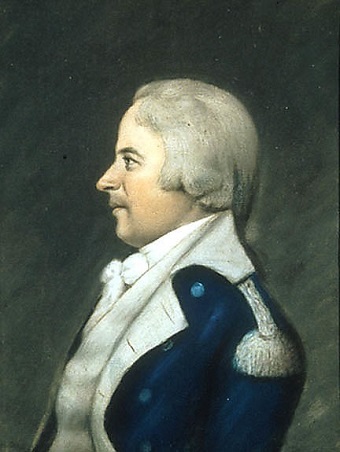When the American General William Hull made an early invasion of Upper Canada, he was convinced that the inhabitants desired freedom from British tyranny. He also feared attack by native warriors. In one sweeping proclamation, Hull tried to impress and threaten the entire region into compliance.
“I come to find enemies not to make them, I come to protect not to injure you.” —American General William Hull

James Sharple Sr., c. 1795–1801
On July 11, 1812, American Brigadier-General William H. Hull led his army across the Detroit River into Upper Canada, capturing the town of Sandwich. Hull’s invasion was the first major offensive since Congress declared war on Britain in June 1812.
To announce his presence in Upper Canada, Hull printed a proclamation to distribute amongst the inhabitants. “The army under my Command has invaded your Country,” he wrote, “and the standard of the United States waves on the territory of Canada.”
Hull was convinced that the inhabitants of Upper Canada would welcome the Americans as liberators from oppressive British rule. His experience in the American Revolution had taught him to hate the British and to believe in American freedom. He reassured the people, “I come to find enemies not to make them, I come to protect not to injure you.”
Convinced that being an American citizen was superior to being a British subject, Hull offered to battle the British army on behalf of the inhabitants. “You will be emancipated from Tyranny and oppression,” he assured them, “restored to the dignified station of freemen.”
Hull also believed that his invasion would frighten the native tribes. In a letter to the Secretary of War, he wrote, “It is likewise probable that when the Indians see the American standard erected on both sides the river it will have a favorable effect.” Like many Americans who lived on the frontier, Hull was wary of native warriors. In his proclamation, he wrote that their method of warfare “respects no rights & knows no wrong.”
To persuade locals from joining with indigenous warriors to resist the American invasion, Hull informed them that any white man fighting alongside native warriors would receive no quarter. Instead, “Instant destruction will be his Lot.”
Hull intended his proclamation to coerce the inhabitants of Upper Canada into accepting the authority of the United States. The British commander, in turn, issued his own proclamation promising to defend Upper Canada—and, in later engagements, took advantage of Hull’s fear of indigenous fighters to force his surrender.
Last updated: May 24, 2016
